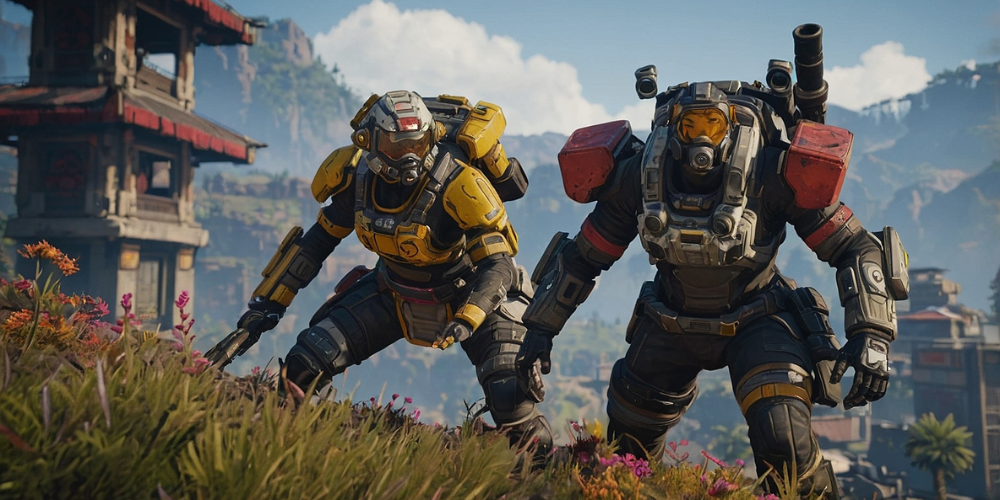Apex Legends: Cross-Platform Squad Tactics: Investigate how cross-platform play affects team dynamics, communication, and strategy in the fast-paced world of Apex Legends
Nov-08-2024

As I immerse myself in the frenetic world of Apex Legends, I can’t help but notice the nuances that cross-platform play brings to team dynamics. With friends on different consoles, the opportunity to team up and strategize together has never been more accessible. The landscape of gaming has shifted significantly, and so too have the dynamics of teamwork. Stepping into the shoes of a player who frequently collaborates with others across various platforms, I’ve observed firsthand how cross-platform play influences our approaches to strategy in this battle royale universe.
The Changing Landscape of Team Communication
When I queue up for a game, I’m not just looking at my squad’s abilities but also how well we can communicate effectively. Each platform carries its own set of communication tools. Console players might favor voice chat through headsets, while PC gamers often exploit keyboard inputs to relay information quickly. This divergence requires compromise and adaptation. I need to ensure I’m articulating plans clearly, recognizing that my teammates may be hearing or typing commands.
Understanding Different Playstyles
One significant aspect I have found is how cross-platform play highlights the differences in playstyles. Players from console backgrounds often develop their skills in a different way compared to those on PC, who might rely more on precise mouse movements. This contrast can create interesting synergies within a squad. For instance, as an experienced controller user, I learned to approach gunfights from an angle that allows for cover and positioning, while my PC teammates would engage with quick flicks and more aggressive maneuvers.
Adaptation to Team Strategies
So, how does this all translate to squad tactics? When preparing for a match, I’ve noticed that flexibility is paramount. My PC teammates tend to excel in rapid engagements, while console players often emphasize safety and positioning. Blending these strategies requires us to communicate frequently, assessing whether to push forward or play defensively based on who’s in the squad.

Role Assignment Beyond Platforms
Another essential element is the assignment of roles within a squad. Each of us has strengths drawn from our gaming history. As a regular console player, I usually prefer to take the role of Support, using characters who can provide healing or advantageous scouting. Meanwhile, a friend on PC might gravitate towards being the Damage Dealer, utilizing characters that excel in firepower. This kind of role allocation isn’t just about personal preference; it’s also influenced by the mechanics and controls unique to our respective platforms.
The Art of Coordination
In high-stakes scenarios, coordination becomes vital. I remember one match where we were pushed into an intense firefight against another squad. My PC teammates could communicate with split-second precision, calling out enemy locations and weaknesses, while I had to manage my shots more steadily with the controller. What emerged was a dance of communication where I advised on repositioning based on what I saw while they coordinated their attacks. This intrinsic harmony is something I’ve come to value in cross-platform games.
Maximizing Utility with Cross-Platform Perks
Across different platforms, each player brings a unique set of utilities. For instance, the tools available on PC for spotting enemies are often superior to those on console. As a team, we capitalize on this by adopting a strategy where our PC players serve as scouts, relaying crucial information while we support from behind. This synergy not only underscores the essence of teamwork but also shows how cross-platform play can enhance utility management.
Embracing Diversity and Cross-Platform Tactics
One remarkable aspect of cross-platform play in Apex Legends is the diversity of player backgrounds and preferences. Each individual contributes unique insights that enrich our tactics. On one occasion, we had a slightly more experienced player in our squad who introduced aggressive tactics I had never considered. Their ability to approach encounters differently taught me new strategies, allowing me to adjust my gameplay style more effectively.

Learning Curve and Skill Development
The learning curve when playing across platforms can't be overstated. Initially, I struggled to keep pace with my PC teammates who had more dexterity with commands and movements. However, as I adapted through practice and learned to anticipate their actions and communication styles, I began to rapidly improve my own gameplay. It’s an ongoing journey that underscores how cross-platform play can be a catalyst for skill development.
Impact on Competitive Dynamics
In competitive matches, the advantage of cross-play manifests significantly. Knowing we could face off against a mixture of players brings an unpredictable element to each match. I’ve spent countless hours studying player movement and adapting strategies based on observed tactics across different consoles. Concentrating on how players from another system approach situations has enriched my strategic depth and awareness.
Community Collaboration
Cross-platform play fosters a sense of community that transcends hardware limitations. In one specific instance, we faced challenges from a prominent streamer who switched between platforms easily, showcasing strategies unheard of in our previous experiences. Engaging with community streams and collaborating with diverse players from both camps opened up a treasure trove of strategies and tips that I could incorporate into my own gameplay.
Time to Sync and Get It Right
Timing is an important factor when coordinating plays. With players on different setups, our coordination can become a bit uneven at times. Whether it’s executing a tactical retreat or going for the offensive, the delay based on platform input can sway the outcome. Recognizing the time it takes for each member to react has pushed us to develop a more tactful communication style, emphasizing counting down engagements to ensure we strike as a cohesive unit.

Building Chemistry Between Platforms
Ultimately, building chemistry among teammates from different platforms has become an art in itself. It requires understanding each other's strengths and weaknesses while fostering effective communication. Trust developed through countless matches has become a foundation for better tactics. I can predict how my teammates will react in specific situations, leading to faster decision-making and improved success rates in our games.
Potential Pitfalls of Cross-Platform Dynamics
Of course, maintaining effective cross-platform play isn’t without challenges. Lag times and discrepancies among platforms can sometimes lead to miscommunications. I recall one harrowing moment when the game’s connection preferences caused me to misunderstand a call, leading to an unfortunate ambush. Such instances remind us that while the dynamics can thrive on diversity, they also require a level of understanding and patience, paving the way for continuous improvement.
Future Perspectives on Cross-Platform Teamwork
As I remain deeply involved in the ever-evolving world of Apex Legends, I can’t help but look forward to the growing potential of cross-platform play to transform teamwork and strategy further. Each match becomes an opportunity to learn, adapt, and overcome the challenges we face together. With each squad comprising varied hardware experiences, the way we connect, communicate, and strategize will only continue to evolve, offering exciting prospects for future battles as I journey onward.







